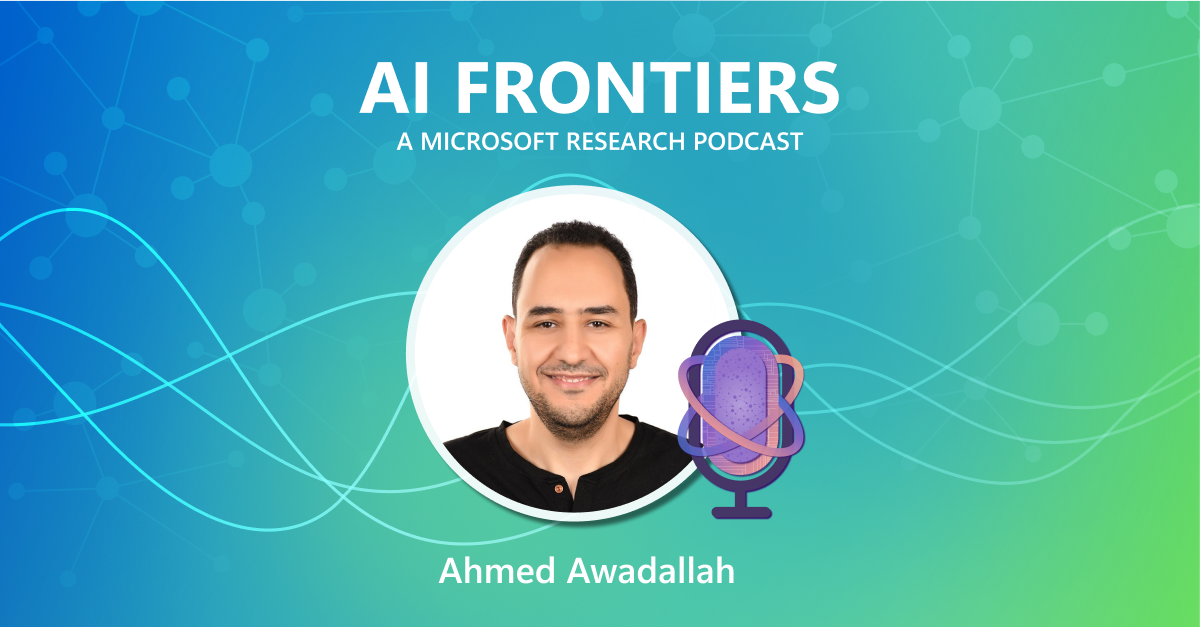By Kristin Tolle (opens in new tab), Principal Program Manager, Machine Learning and Kenji Takeda (opens in new tab), Solutions Architect, Microsoft Research
Data science can be a superpower. While we can’t solve all the ills of the world with machine learning, applying data science to just about any problem nudges us a little closer to a solution. Helping students discover that truth is a prime motivator for the challenges and hackathons that Microsoft Research supports around the world.
Inspiration for students
MICROSOFT RESEARCH PODCAST
AI Frontiers: The future of scale with Ahmed Awadallah and Ashley Llorens
This episode features Senior Principal Research Manager Ahmed H. Awadallah, whose work improving the efficiency of large-scale AI models and efforts to help move advancements in the space from research to practice have put him at the forefront of this new era of AI.
The best way to learn is by doing, which is why Microsoft started the global Data Science Student Challenge, supporting events at Columbia University (opens in new tab), ENSAE ParisTech (opens in new tab), University College London (opens in new tab) (UCL), Indian Institute of Science (opens in new tab) (IISc), National University of Singapore, and University of Melbourne. This is where students—undergrads and graduate, computer science majors and students from other disciplines—are given access to large datasets and cloud computing, and are let loose to tackle real problems. The issues these students address are as local as identifying buildings at risk of under-heating in New York City, and as global as helping France’s Red Cross maximize the effectiveness of their programs.
Patricia Culligan, Associate Director of the Columbia University Data Science Institute (opens in new tab), expressed what all researchers in the field know: “We need to educate more people with data science tools, and expose them to the type of problems that those tools can address.” Professor John Shawe-Taylor, head of the Computer Science Department at UCL, explains further, “The key for a student to really understand and feel enthused about what they’re studying, [is that] they need to see how it is relevant to the real-world job they might end up with, and real-world experiences of people. What we need to do is not just teach them the theory of computer science, we need to show them how that theory is relevant and impacts on real-world problems.”
Participants in the hackathons found Microsoft Azure Machine Learning to be powerful and easy to use, combining their own knowledge of R and Python with the built-in algorithms using ML Studio. “I found that Azure ML was great because of how smooth the workflow got, and the ability to swap between languages,” Morgan Schmitz, data science student at ENSAE, enthused. Hyojong Justin Kim from UCL goes further, comparing Azure Machine Learning to MIT’s popular kids’ programming environment: “…for me [it’s] like Scratch (opens in new tab) for data science, it makes everything so much easier, and [allows me to] visualize everything. So I just have to drag-and-drop and boom it’s done!
The challenges are one way that students can tap into their desire to make a difference. Another is the Data Science Summer School (opens in new tab) in New York City, where each year a small group of undergraduates learn how to apply data science to problems that really matter to them and their city. The results from past years (opens in new tab) have been impressive, and have been recognized at the 2014 KDD Workshop on Data Science for Social Good (opens in new tab) and 2015 Conference for Digital Experimentation (opens in new tab).
Programs for researchers and educators
Regardless of where you are in your academic or research career, there are a number of ways we can support you. Azure for Research (opens in new tab) offers access to cloud computing for your data science projects, as well as training around the world. Cortana Intelligence Suite (opens in new tab) offers big data advanced analytics. Students can get a DreamSpark account (opens in new tab) on Microsoft Azure to use for their coursework and educational activities. The DreamSpark program gives students no-cost access to the Microsoft software used by professional developers. Schools that are enrolled in DreamSpark can get additional software as well. If you’re an educator interested in bringing data science tools to your classroom, or if you want to point your students to low- and no-cost access to software and developer tools, visit the Azure in Education (opens in new tab) program.
Learn more
- Developing the next wave of data scientists (opens in new tab)
- Data science at Microsoft Research (opens in new tab)
- Azure for Research (opens in new tab)
- Azure for Education (opens in new tab)
- Apply for the Azure for Research Data Science Award (opens in new tab)
- Cortana Intelligence Suite (opens in new tab)
- DreamSpark for Students (opens in new tab)
- Microsoft Research Data Science Summer School (opens in new tab)
- Columbia Data Science Student Challenge (opens in new tab) – Video
- University College London Data Science Student Challenge (opens in new tab) – Video
- ENSAE Paris-Tech Data Science Student Challenge (opens in new tab) – Video
- Indian Institute of Science (opens in new tab) – Video


